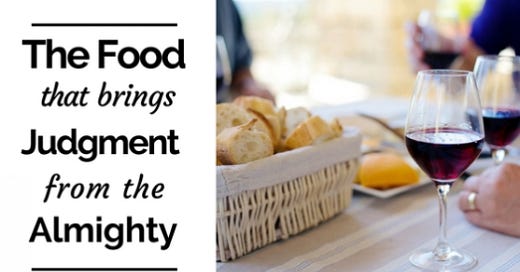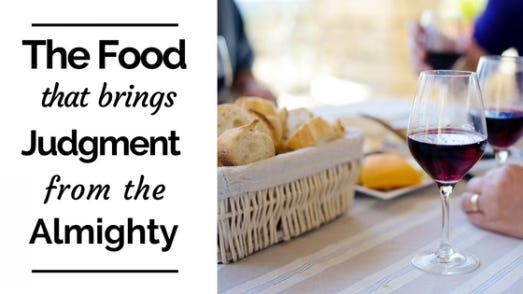The Food that Brings Judgment from the Almighty
When to be especially carefully eating bread and drinking wine
Careless Communion
The most interesting communion ceremony I observed was while working as a house parent for teenage girls. The job allowed many opportunities to visit various churches desiring to minister to the less fortunate girls in our care.
During Communion, one non-denomination church passed out prepackaged grape juice cups similar to single serving coffee creamers with pull off paper lids. But inside the lid was a small wafer of bread. It was like fast food communion.
[Update: This new way of communing went mainstream after 2020.]
How the elements were dispensed was not a problem for me. But as I listened to the pastor invite the congregation to partake, I realized that the church had no idea about the gravity of taking the Lord's Supper.
Missing Elements
There was no mention of who was worthy to partake (i.e. that it was for believers only)
No prompting to confess sin or examine oneself in light of God's Word
And no warning of the consequences to those who take it carelessly
In that instance, I opted to let the plastic cup pass by me, because I did not want to be a part of the potential judgment on others. God takes Communion seriously — so seriously that He warns against the careless supping thereof.
Sign and Seal
We recently talked about Communion as the sign and seal of the New Covenant in part seven of 10 Ways Food Impacts History, Life, and the World.
While the Lord's Supper is a spiritual picture of the death of Christ and the benefits of His blood to those who believe, it is celebrated with common elements, bread and wine. Read more here, Food: A Sign and Seal of the Covenant.
Antithesis of Blessing
But there is a commonly overlooked health principle which is the antithesis of the blessings of the Lord's Supper. When ignored, the Bible clearly teaches that sickness and death can result as judgment from the Almighty.
The key passage is found in I Corinthians 11:27-30.
Therefore whoever eats the bread or drinks the cup of the Lord in an unworthy manner, shall be guilty of the body and the blood of the Lord. But a man must examine himself, and in so doing he is to eat of the bread and drink of the cup. For he who eats and drinks, eats and drinks judgment to himself if he does not judge the body rightly. For this reason many among you are weak and sick, and a number sleep.
Let's go over this passage step by step to see why God would bring sickness and death to those who do not properly take Communion.
An Unworthy Manner.
The above passage teaches that anyone who takes the Lord's Supper in a careless manner is guilty of the body and blood of the Lord. The gravity of Christ's death on the cross and the suffering He endured to ensure salvation to His people should not be taken lightly. Many like to think that salvation is free — but it is not. It cost the life of a sinless man, who suffered a cruel death so we would not have to be eternally separated from God. Matthew Henry writes of those who take lightly Christ's death in Communion:
They profane the institution, and in a manner crucify their Saviour over again. Instead of being cleansed by his blood, they are guilty of his blood.
Though to some degree we are all guilty of nailing Christ to the cross, we should not want to take that guilt upon ourselves. We must not take the Lord's Supper in an unworthy manner.
Must Examine Himself.
The remedy for the guilt associated with the blood of Christ is to examine ourselves correctly. Me must acknowledge our sin — not by the standard of another man or law, but by the perfect standard of righteousness, which is God Himself. This standard is summed up in the two greatest commandments:
To love God with all our heart, soul, and mind
To love our neighbors as ourselves
These two commandments, according to Christ, sum up the whole law and prophets. Our standard for righteousness is all of God's holy law and will. And we don't measure up. We never will. This is why Christ had to die in our place. He was the only One able to uphold all of God's righteous decrees perfectly. God knew that fallen man could never love Him as we ought and could never love our neighbor as we should, perfectly.
Judgment to Himself.
After one examines himself at the communion table, he is to eat and drink. The eating and drinking does not occur before examining, but after. And the one who does not examine himself in light of his or her standing before God brings judgment upon himself according to the Scripture.
Either we are proactive, examining our heart before the Lord, judging our own actions against the standard of God — or God judges us. God's forgiveness is plenty. 1 John 1:9 teaches that if we confess our sins, He is faithful and just to forgive our sins and cleanse us of all unrighteousness — faithful because He will do it, and just because He paid the penalty on the cross.
When we forget these truths, especially during Communion, we should not expect to receive the benefits of forgiveness, bur rather God's judgment.
But what judgment?
Many Are Weak and Sick
Many of the Corinthians had not been examining themselves during the Communion service. And Paul tells them it is the reason there were a great number of them weak, sick, and even dead (sleeping).
If God judged the Corinthians for taking Christ's death lightly, He will do the same today. How many Christians or professing believers are sick because they violate this simple biblical principle? We may never know. But we should be moved to fear of an awesome God, even now examining our own selves in light of His holy inerrant Word, being diligent to take the Lord's Supper with all reverence and awe. For He is a consuming fire and judgment begins in the household of God.
Food Matters
Again we see how food and drink are important to God. Bread and wine were given first for physical nourishment and joy, and later commanded to be taken as a symbol of the New Covenant in Christ's blood, even life eternal. But this very symbolic food, when taken without the proper examination of the body can bring the opposite -- even sickness and death to the body.
If you are weak or sick, be sure to examine yourself in light of 1 Corinthians 11:27-30. If your church is not taking the death of Christ seriously by not eliciting the examination of sin prior to partaking the elements, it may be time to talk to your pastor or find a new church. Your life and health and the life and health of others could be at stake.
This was part eight in our 10 part series: 10 Ways Food Impacts History, Life, and the World.
Next: Food Fosters Fellowship and Community
Return to: Biblical Health Study
Did you enjoy this post?



